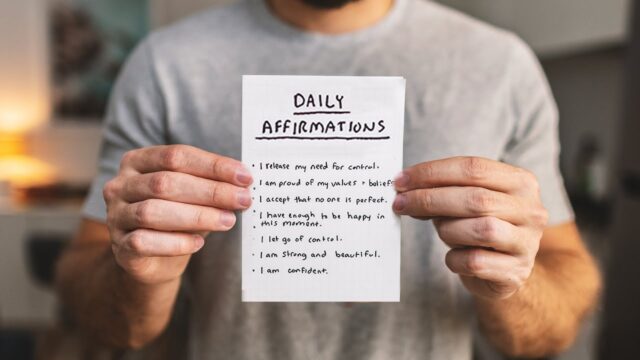
Many people use affirmations all the time, for different purposes. Some people do it in an attempt to program their subconscious, while others may use affirmations so that they won’t forget their goals and motivations.
Affirmations can help you focus on the things that you consider important, and they can help you guide your thoughts in the right direction.
Affirmations are an effective self-care tool. Your subconscious mind plays an important role in the formation of desires, their manifestation, and self-actualization. Therefore, if you change the way you think, you can also change the way you behave. This way, you can feel better about yourself and shape your daily life.
The power of the subconscious is a reason why positive affirmations are popular in cognitive behavioral therapy.
According to the theory of cognitive-behavioral therapy, mental health problems can be rooted in unhelpful thinking patterns. Therefore, changing these patterns and removing negative beliefs can help cope with various mental health issues, including anxiety, depression, low self-esteem, traumas, etc.
Affirmations can help you change your beliefs and thoughts that stop you from enjoying your life.
For example, self-love affirmations can help you improve your self-esteem, and relationship affirmations allow you to address problems in your relationships. Affirmations are aimed to shift your mindset, and they can be very effective.
However, if you want affirmations to work for you, you should know how to use them properly.

Do Affirmations Work?
Affirmations became popular back in the 1920s, and since then, they’ve been used by psychologists, self-help gurus, and coaches throughout the world.
Why are affirmations so popular?
According to research, affirmations can improve one’s problem-solving skills and help cope with stress. Affirmations for self-esteem can also help tackle ego depletion, which is a common effect of stress.
Affirmations can help you:
- Improve task-related performance
- Make you less critical about your own mistakes
- And help deal with social rejection.
Another study shows that affirmations can become automatic. The more you repeat them, the more positive thoughts you have, and the easier it gets for you to have these thoughts again in the future.
Affirmations can become more and more effective over time, and their increasing effectiveness can be explained by neuroplasticity. Neuroplasticity is the human brain’s ability to adapt to new circumstances and change throughout our lives, even when we reach adulthood. Thanks to neuroplasticity, you can change your thinking patterns by teaching your brain to think positively. And daily affirmations can be a very effective training tool.
Research data also shows that affirmations can help maintain high self-esteem when dealing with threats. For instance, if you’re criticized by your boss or other people from your environment, self-love affirmations can help you feel good about yourself despite the negativity that you receive from others.
As you can see, affirmations have proven to be effective, and their usefulness is backed by a lot of research. You can use affirmations as a self-care practice to improve your overall emotional well-being.
Let’s consider affirmations in more detail so that you can learn to use them properly.

What Affirmations Look Like
So, what are affirmations? These are statements that serve as reminders and inspiration. They can help you stay focused on your goals throughout the day and generate helpful positive thoughts.
Effective affirmations are:
Written in the first person
Affirmations should begin with “I,” “I am,” “my,” etc. This way, affirmations turn into identity statements. Such statements work as powerful motivators.
For example, one may use such affirmations as “I feel confident around people,” “I enjoy eating healthy food,” “I am a compassionate person,” etc.

Positive
Affirmations are all about developing positive thinking so make sure to formulate your affirmations in a positive way.
For instance, instead of saying “I no longer like alcohol,” you can say “I’m free from alcohol,” or “I enjoy my life without alcohol.”
Emotionally charged
Emotionally charged statements can help utilize the power of associations and make affirmations more effective. Writing affirmations can help you change your mood, which is very important for motivation.
For instance, instead of saying “I make healthy food choices,” you can say “I feel alive and full of energy when I eat healthy food.”
Written in the present tense
Affirmations focus on the things that you want to happen in the future, but you should write them as if they had already happened.
For example, you should write “I feel confident” instead of “I will feel confident soon.” The reason is that when you act as if something was true, you can experience emotions associated with the desired outcome, and such emotions will motivate you to take the right actions.

How to Make Them Work?
We’ve already mentioned that affirmations become more effective as you repeat them. If you want affirmations to work for you, you should use them every day. A great approach is to start your day with affirmations and repeat them before you go to sleep.
You can also write down your daily affirmations on stickers or cards and place them where you can see them.
Besides, you can try writing affirmations every day instead of simply reading them because the writing process engages different areas of your brain. When writing, you think of what you’re going to write, and you focus on each and every word.
You can also use various apps with pre-written affirmations on different topics, but writing your own affirmations is definitely a great choice because you can tailor them to your specific goals.
How to Create Powerful Affirmations

1. List your traits you’d like to change
First, you should determine the traits that you’d like to change by using affirmations. When listing them, you may consider criticism from other people or simply reflect on your personal and professional life and think of what you need to improve.
If the list is too long, sort all traits from it by priority and determine common themes so that you can figure out what you should focus on.
2. Rephrase “negative” traits as positive affirmations
Use antonyms to develop your positive affirmations based on the aspects that you want to change.
For instance, if you’re too sensitive when it comes to criticism, your affirmation might be “I’m calm/strong/laid-back,” or “I withstand any criticism.” Make sure to choose words that resonate with you.
3. Repeat your affirmations
You can repeat your affirmations out loud or silently. The main thing is to do it frequently, at least twice a day. You may repeat your affirmations while doing some repetitive tasks.
For example, you can go through your list of positive affirmations during your morning routine or while doing chores. If you practice self-hypnosis, you can also incorporate affirmations into your sessions as suggestions.

9 Best Affirmations That Actually Work
Here are some examples of powerful affirmations that might help you get started. You may modify them according to your specific goals and priorities.
1. I accept and love myself the way I am
Simple self-love affirmations can help you boost your self-esteem and improve your relationships with others because the way you behave around other people largely depends on how you feel about yourself.
2. I’m worthy of love and happiness
This is one of the main “I am” affirmations that everyone should try. It will help you deal with self-esteem issues and believe in yourself.

3. My life is filled with meaning and purpose
This affirmation will help you seek meaningful experiences and feel purpose in your life.
4. I keep learning, evolving, and getting stronger every day
Personal and professional growth is a continuous process that may take a lot of time and effort. You can stay motivated by reminding yourself of the fact that you get closer to your goals every day.
5. I have the power within me to achieve what I want
This affirmation can help you recognize your power so that you can achieve what you want. Sometimes, you may need to change your habits or develop new skills to accomplish your goals, so it’s important to remind yourself that you can do it.

6. I am present in this moment and I let go of the past
Sometimes, your past may hold you back. Your past experiences and failures may stop you from trying new things and setting ambitious goals, so it’s important to be able to just let go of the past and focus on the current moment.
This is one of the best affirmations that can help you practice mindfulness and realize that the past is not relevant to your current goals and aspirations.
7. Every day brings infinite possibilities
If you cannot accomplish something or get what you need today, everything might change tomorrow. Don’t give up and enter the new day with a positive attitude.
8. I have positive and supportive relationships with others
This affirmation won’t let you forget about the importance of positive relationships and will motivate you to build healthy relationships with others.

9. I’m grateful for what I have in my life
Gratitude affirmations can improve your mood and boost your awareness of the good things that you have in your life. The feeling of gratitude can help you attract even more positive things.
Final Thoughts
Positive affirmations are an effective self-care tool that can help you improve your self-esteem and cope with various mental health issues, including anxiety and depression.
Affirmations can also be used as part of cognitive-behavioral therapy.
If something stops you from living a fulfilling life, you can benefit from talking to a licensed therapist who will help you figure out what the problem is and provide the necessary emotional support.
If you have a tight schedule, you may not have enough time for traditional in-person therapy. Fortunately, you can also use online therapy platforms like Calmerry to talk to a therapist from the comfort of your home, conveniently.









